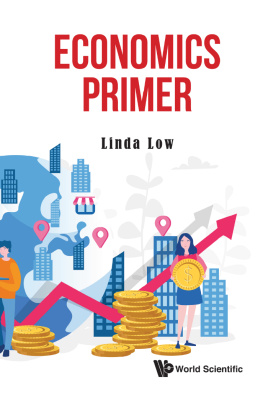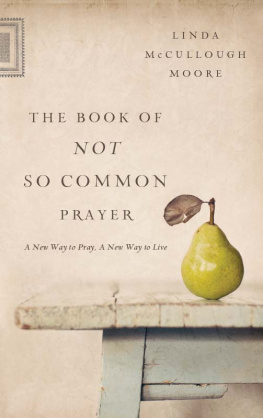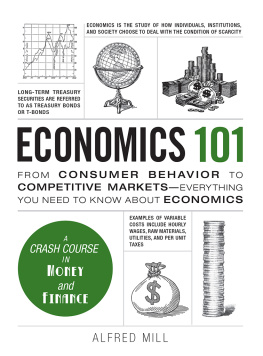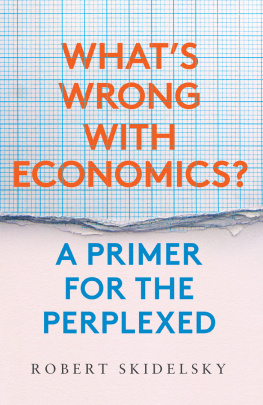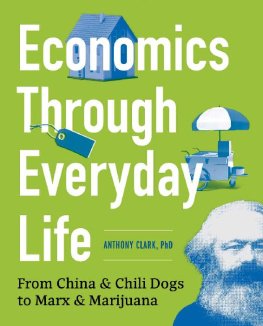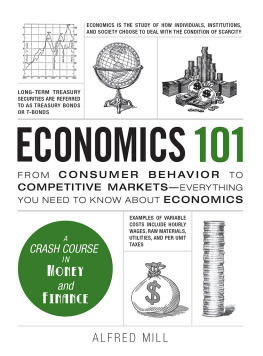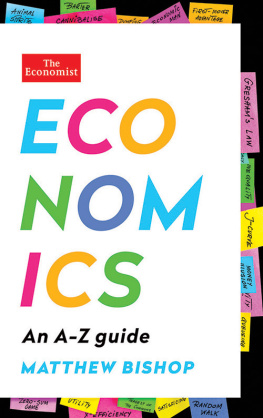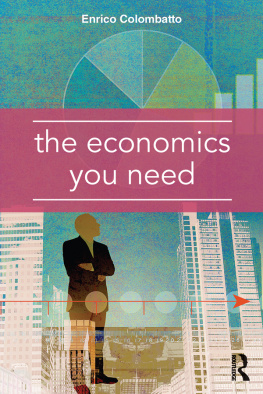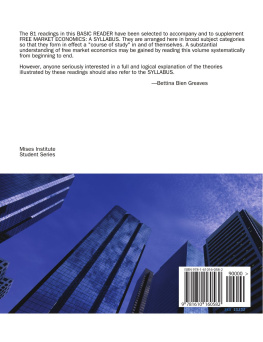Linda Low - Economics Primer
Here you can read online Linda Low - Economics Primer full text of the book (entire story) in english for free. Download pdf and epub, get meaning, cover and reviews about this ebook. year: 2020, publisher: World Scientific, genre: Home and family. Description of the work, (preface) as well as reviews are available. Best literature library LitArk.com created for fans of good reading and offers a wide selection of genres:
Romance novel
Science fiction
Adventure
Detective
Science
History
Home and family
Prose
Art
Politics
Computer
Non-fiction
Religion
Business
Children
Humor
Choose a favorite category and find really read worthwhile books. Enjoy immersion in the world of imagination, feel the emotions of the characters or learn something new for yourself, make an fascinating discovery.
- Book:Economics Primer
- Author:
- Publisher:World Scientific
- Genre:
- Year:2020
- Rating:3 / 5
- Favourites:Add to favourites
- Your mark:
- 60
- 1
- 2
- 3
- 4
- 5
Economics Primer: summary, description and annotation
We offer to read an annotation, description, summary or preface (depends on what the author of the book "Economics Primer" wrote himself). If you haven't found the necessary information about the book — write in the comments, we will try to find it.
Economics Primer — read online for free the complete book (whole text) full work
Below is the text of the book, divided by pages. System saving the place of the last page read, allows you to conveniently read the book "Economics Primer" online for free, without having to search again every time where you left off. Put a bookmark, and you can go to the page where you finished reading at any time.
Font size:
Interval:
Bookmark:

Linda Low
Singapore University of Social Sciences, Singapore

Published by
World Scientific Publishing Co. Pte. Ltd.
5 Toh Tuck Link, Singapore 596224
USA office: 27 Warren Street, Suite 401-402, Hackensack, NJ 07601
UK office: 57 Shelton Street, Covent Garden, London WC2H 9HE
National Library Board, Singapore Cataloguing in Publication Data
Name: Low, Linda.
Title: Economics primer / Linda Low.
Description: Singapore : World Scientific, [2020]
Identifier(s): OCN 1140677714 | ISBN 978-981-12-1843-9 (paperback) | ISBN 978-981-12-1792-0 (hardcover)
Subject: LCSH: Economics.
Classification: DDC 330--dc23
British Library Cataloguing-in-Publication Data
A catalogue record for this book is available from the British Library.
Copyright 2020 by World Scientific Publishing Co. Pte. Ltd.
All rights reserved. This book, or parts thereof, may not be reproduced in any form or by any means, electronic or mechanical, including photocopying, recording or any information storage and retrieval system now known or to be invented, without written permission from the publisher.
For photocopying of material in this volume, please pay a copying fee through the Copyright Clearance Center, Inc., 222 Rosewood Drive, Danvers, MA 01923, USA. In this case permission to photocopy is not required from the publisher.
For any available supplementary material, please visit
https://www.worldscientific.com/worldscibooks/10.1142/11764#t=suppl
Desk Editor: Jiang Yulin
Typeset by Stallion Press
Email:
Printed in Singapore
This Primer is for Maddy
Linda Low, Associate Professor, Singapore University of Social Sciences, started in the Ministry of Finance, Singapore doing tax research before joining the National University of Singapore, then became a Senior Research Fellow at the Institute of Southeast Asian Studies (now Yusof Ishak Institute, Singapore). For eight years, she was the Head of Strategic Planning in Abu Dhabi Government (United Arab Emirates, UAE) and Senior Economic Adviser for Abu Dhabi Council for Economic Development as well as Adjunct Professor at UAE University and UAE Higher Colleges for Technology. Her research includes public sector economics and public policy, public enterprises and privatisation, social security and retirement, ageing, health economics, human resources development and manpower policies, international trade and regionalism, international political economy and development economics, with publications in Asia-Pacific, Association of Southeast Asian Nations (ASEAN) and Gulf Cooperation Council (GCC). She works with the Asia-Pacific Economic Cooperation (APEC) and Asia-Pacific Economic Cooperation Council (PECC). She also collaborates with National Trades Union Congress (NTUC) and Singapore Civil Service College for skills training.
Quoting a poem by Rudyard Kipling, this Primer has the same aims as his six honest serving men:
I keep six honest serving-men
(They taught me all I knew);
Their names are What and Why and When
And How and Where and Who.
This Primer is preparatory Economics, simplified for students and laymen in daily life, as a stepping stone to understand more complex economic events around the world today. This chapter reviews some basic economic concepts as a start.
In an integrated globalised world economy, there is nowhere to hide in economies open to trade, investment and people crossing borders. shows the circular flow among the main economic actors as households and firms. They represent demand and supply respectively with government in taxation and expenditure. Adding trade makes an open economy with foreign households, firms and governments in action.

Figure 1.1Circular flow
The factors comprise land, labour and capital, used by firms to produce goods and services, demanded by households also as suppliers of labour. Economics is about human behaviour making rational decisions in consumption, saving, production and investment, all grounded on benefits and costs or net benefits.
In circular flow models, the basic actors in any economy are the consumers in households on the demand side and producers in businesses or firms on the supply side to reflect the see-saw in shows businesses produce and supply goods and services to the households. Households in turn provide factors of production in land, labour and capital.
Starting as a closed economy, shows a see-saw definition of unlimited human wants (heavy end) in contrast to limited resources (lighter end) with the balancing by the private and/or public (government) sectors.
goods and services or outputs as unlimited human wants. Human satisfaction is beyond basic needs in food, clothing and shelter to become luxury goods.
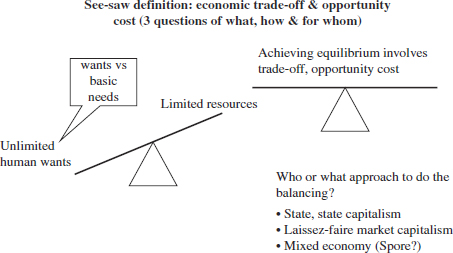
Figure 1.2See-saw definition of economics
Understanding that economic growth is quantitative as gross domestic product (GDP) and economic development is quality of life. More consumption of goods and services is desired to attain social welfare which is based on some distribution systems by the government. Individuals and households make rational choices for private goods. The governments collective role in defence and police is rational. It is rational in providing public education and public health for society as a whole based on externalities of public goods. Singapore excels as its competitive advantage lies in its human resource development.
The circular flow concept in shows what goes around, comes around. The inner set of arrows show a barter exchange of goods and services. In a monetised economy, money is a medium of exchange. The outer set of arrows show consumer spending paid to businesses which in turn pay households factor incomes in wages and earnings.
To illustrate the basic circular flow, banks, equity and capital market or labour market. Circular flows are self-equilibrating without any intervention or intermediation.
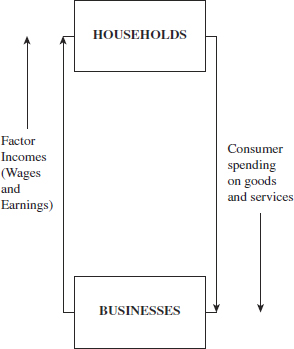
Figure 1.3The basic circular flow model
shows a more realistic circular flow of income and spending in an open economy. It incorporates other economic agents, mainly, government, rest of the world or world economy with exports and imports, and financial markets as intermediaries for saving and investment. In an open economy, foreign households and businesses are at work in all transactions.
Distinguishing the flows further into leakages and injections:
Injections are flows which increase circular flows and economic activity as a whole. They comprise investment (I) to increase production capacity, export (X) to earn foreign exchange from the rest of the world and government spending (G) of state provided goods and services.
Font size:
Interval:
Bookmark:
Similar books «Economics Primer»
Look at similar books to Economics Primer. We have selected literature similar in name and meaning in the hope of providing readers with more options to find new, interesting, not yet read works.
Discussion, reviews of the book Economics Primer and just readers' own opinions. Leave your comments, write what you think about the work, its meaning or the main characters. Specify what exactly you liked and what you didn't like, and why you think so.

